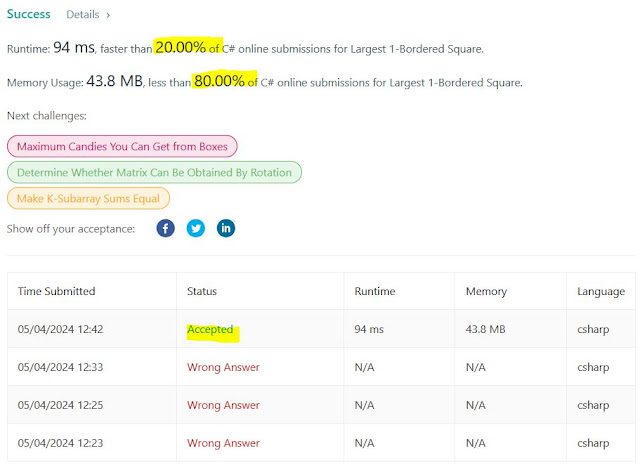Don't be ashamed of N^4 (well, in some cases)
Polynomial solutions are of course exponentially better than non-polynomial solutions (pun-intended). Comparing an N^2 with a 2^N is a no brainer, same for LogN with a SQRT(N) (the former is way better than the latter). The value of N clearly matters, though. The problem below is solved with an N^4 solution, where N=100. Now it is pushing the limits of LC, which won't ever accept a 10^9 solution (billion), but in some cases 100M is tractable. That's the case here. Best way to solve it IMO is to have a function to check whether the boundaries of the sub-matrix form a valid square. That one is tricky, requires some careful calculations. It runs in O(N). Once you have it, then you still need an N^3 nested-loops to check each sub-matrix. If N is relatively small, don't be ashamed of N^4. There must be a way to do it faster, but this is the best that your friend here could come up with. Cheers, ACC.
1139. Largest 1-Bordered Square
Medium
Given a 2D grid of 0s and 1s, return the number of elements in the largest square subgrid that has all 1s on its border, or 0 if such a subgrid doesn't exist in the grid.
Example 1:
Input: grid = [[1,1,1],[1,0,1],[1,1,1]] Output: 9
Example 2:
Input: grid = [[1,1,0,0]] Output: 1
Constraints:
1 <= grid.length <= 1001 <= grid[0].length <= 100grid[i][j]is0or1
Accepted
24,869
Submissions
49,582
public int Largest1BorderedSquare(int[][] grid)
{
int retVal = 0;
for (int r = 0; r < grid.Length; r++)
{
for (int c = 0; c < grid[r].Length; c++)
{
int cDelta = 0;
int len = 0;
while (c + cDelta < grid[r].Length && grid[r][c + cDelta] == 1)
{
len++;
if (IsSquare(grid, r, c + cDelta, len))
retVal = Math.Max(retVal, len * len);
cDelta++;
}
}
}
return retVal;
}
private bool IsSquare(int[][] grid, int initRow, int endCol, int len)
{
//Down
bool isSquare = true;
for (int r = 0; r < len; r++)
{
if (initRow + r >= grid.Length ||
grid[initRow + r][endCol] != 1)
{
isSquare = false;
break;
}
}
if (!isSquare) return false;
//Left
for (int c = 0; c < len; c++)
{
if (initRow + len - 1 >= grid.Length ||
endCol - c < 0 ||
grid[initRow + len - 1][endCol - c] != 1)
{
isSquare = false;
break;
}
}
if (!isSquare) return false;
//Up
for (int r = 0; r < len; r++)
{
if (initRow + r >= grid.Length ||
endCol - len + 1 < 0 ||
grid[initRow + r][endCol - len + 1] != 1)
{
isSquare = false;
break;
}
}
return isSquare;
}




Comments
Post a Comment